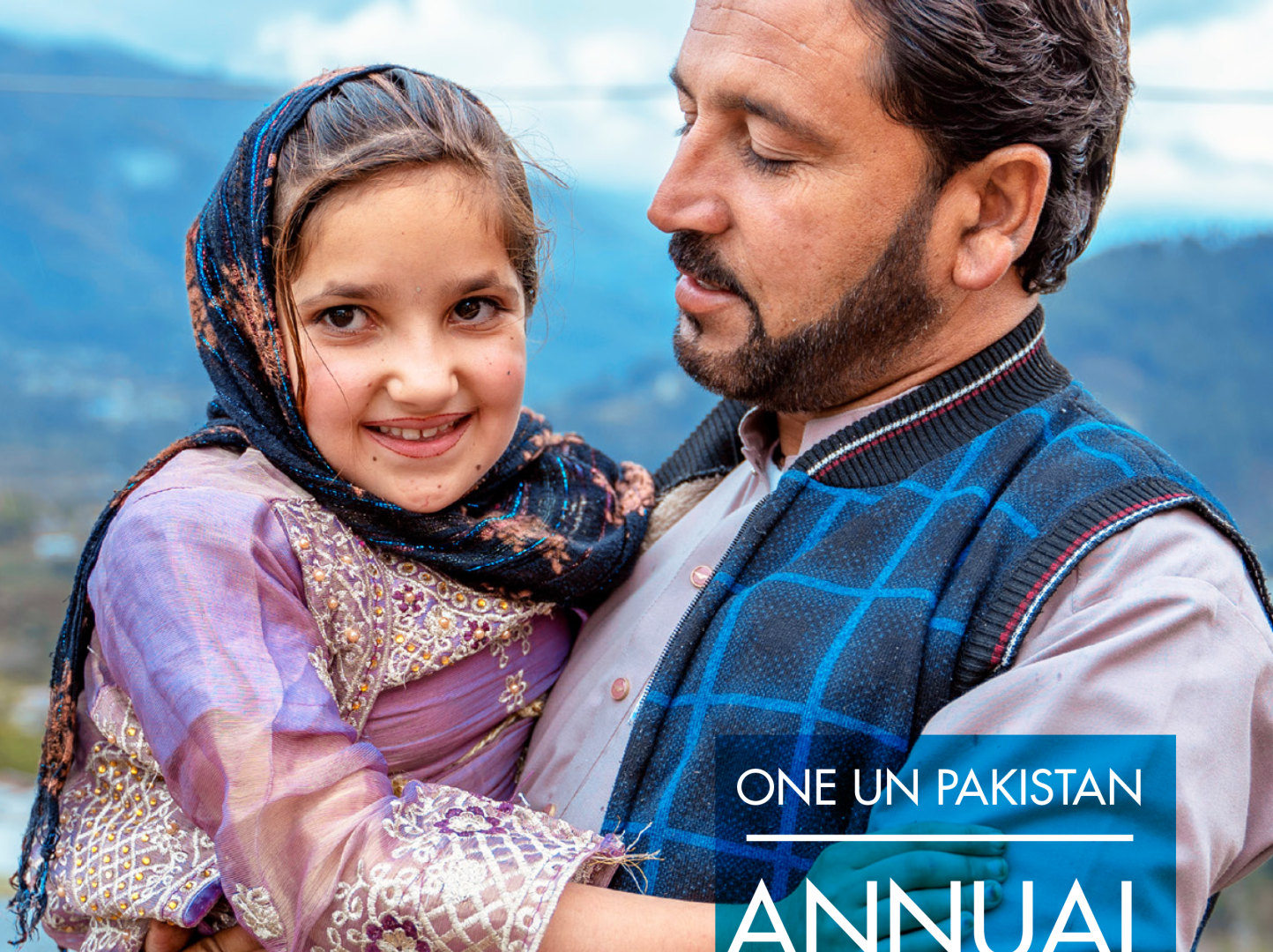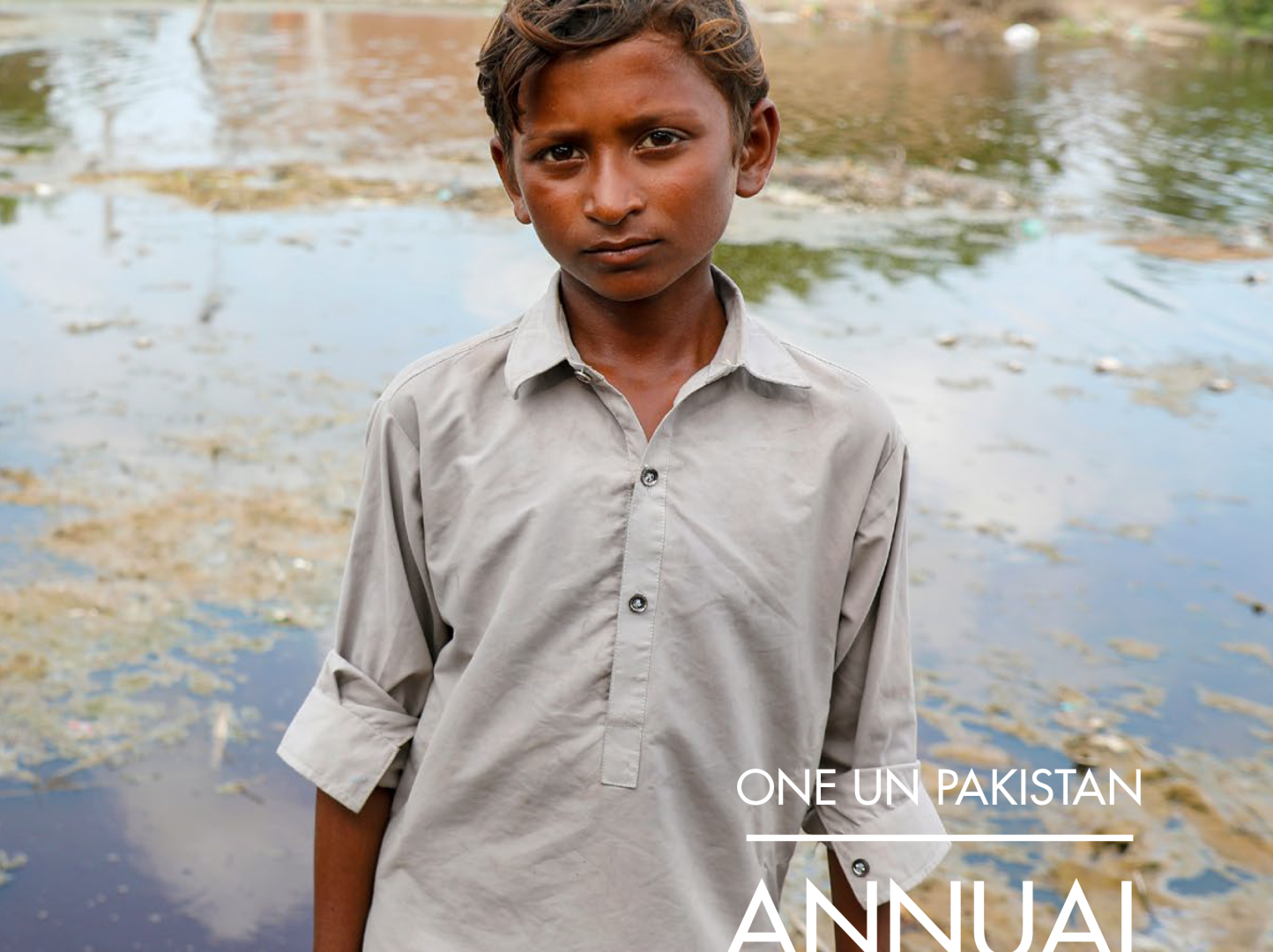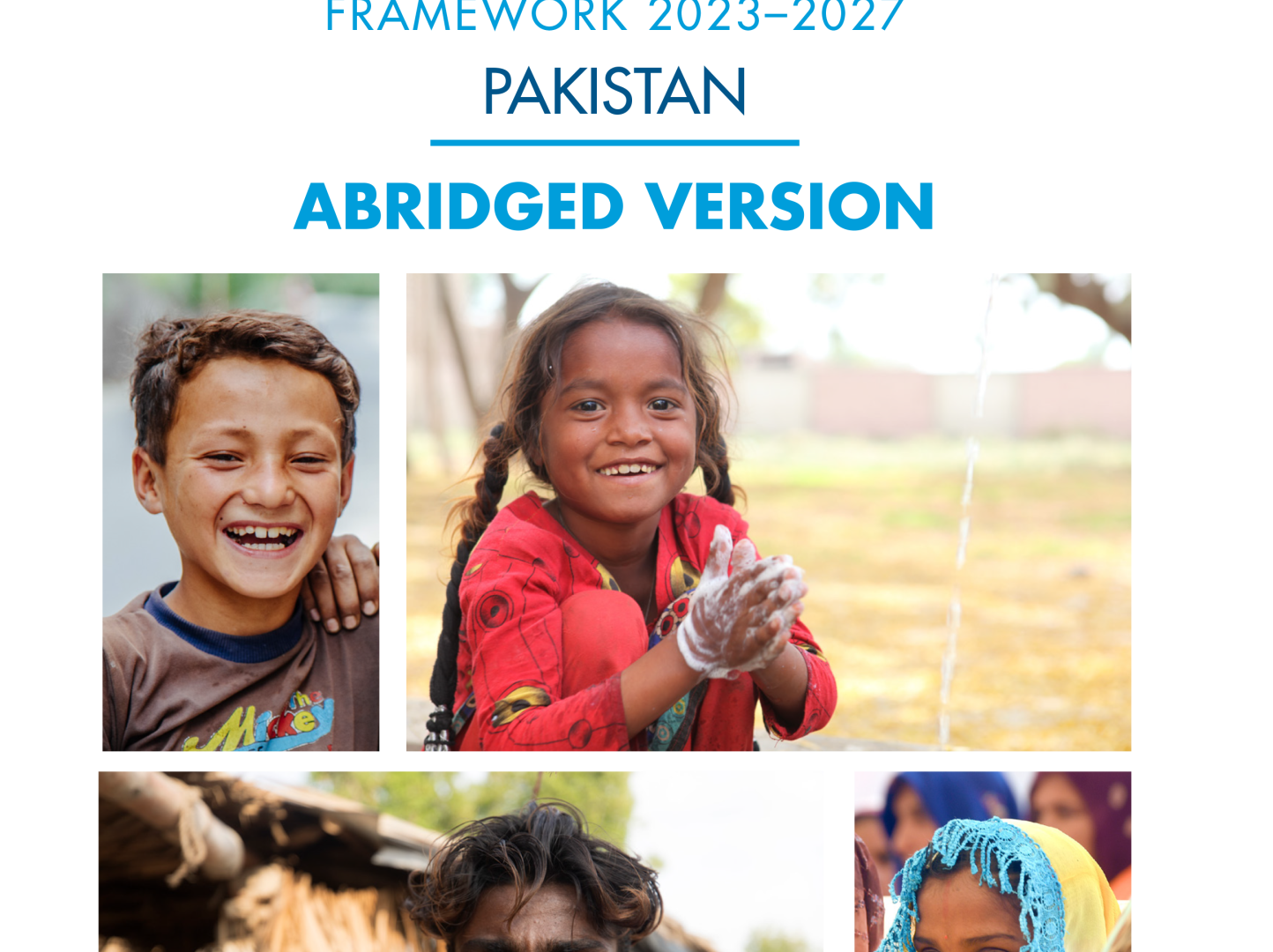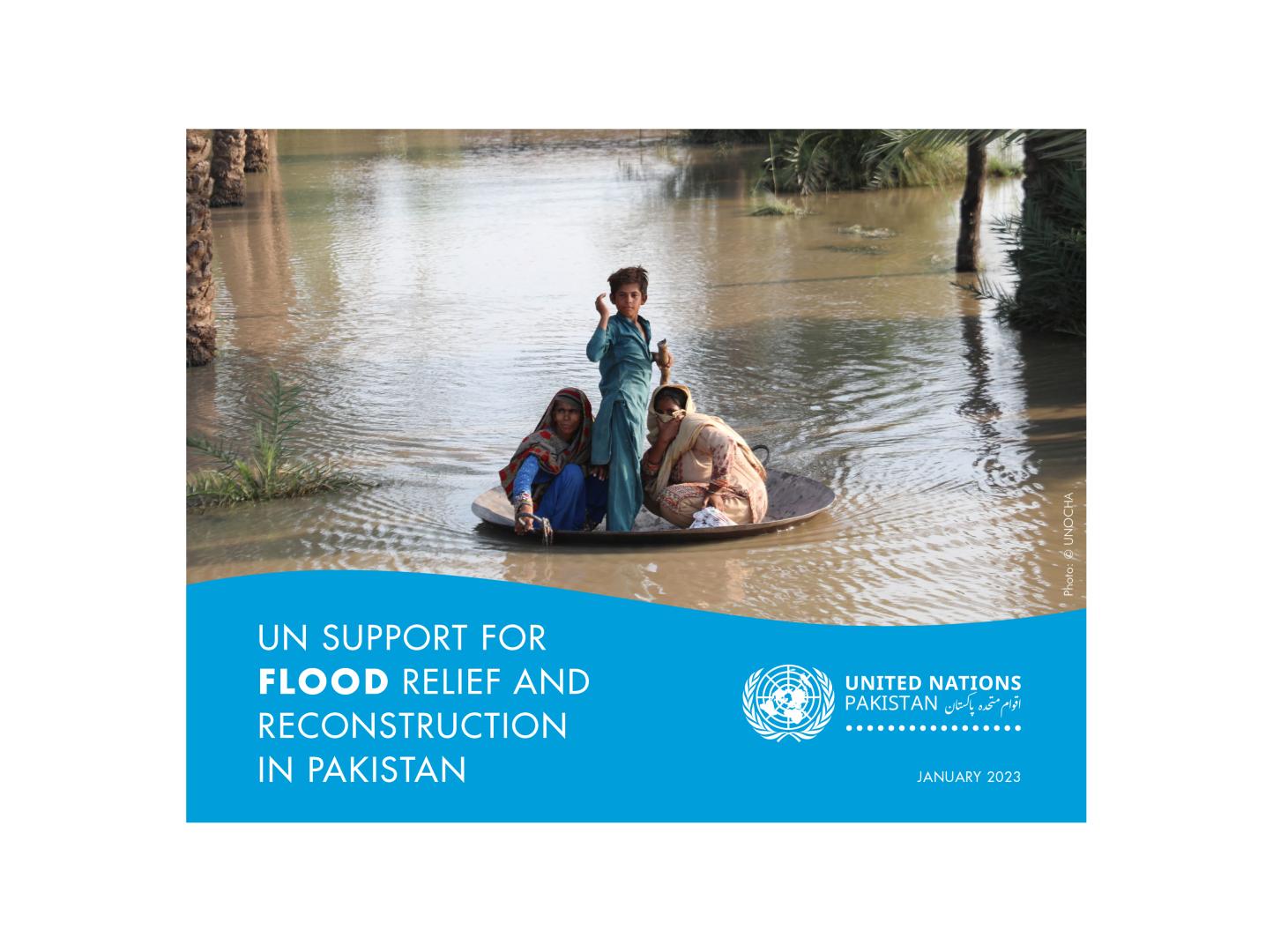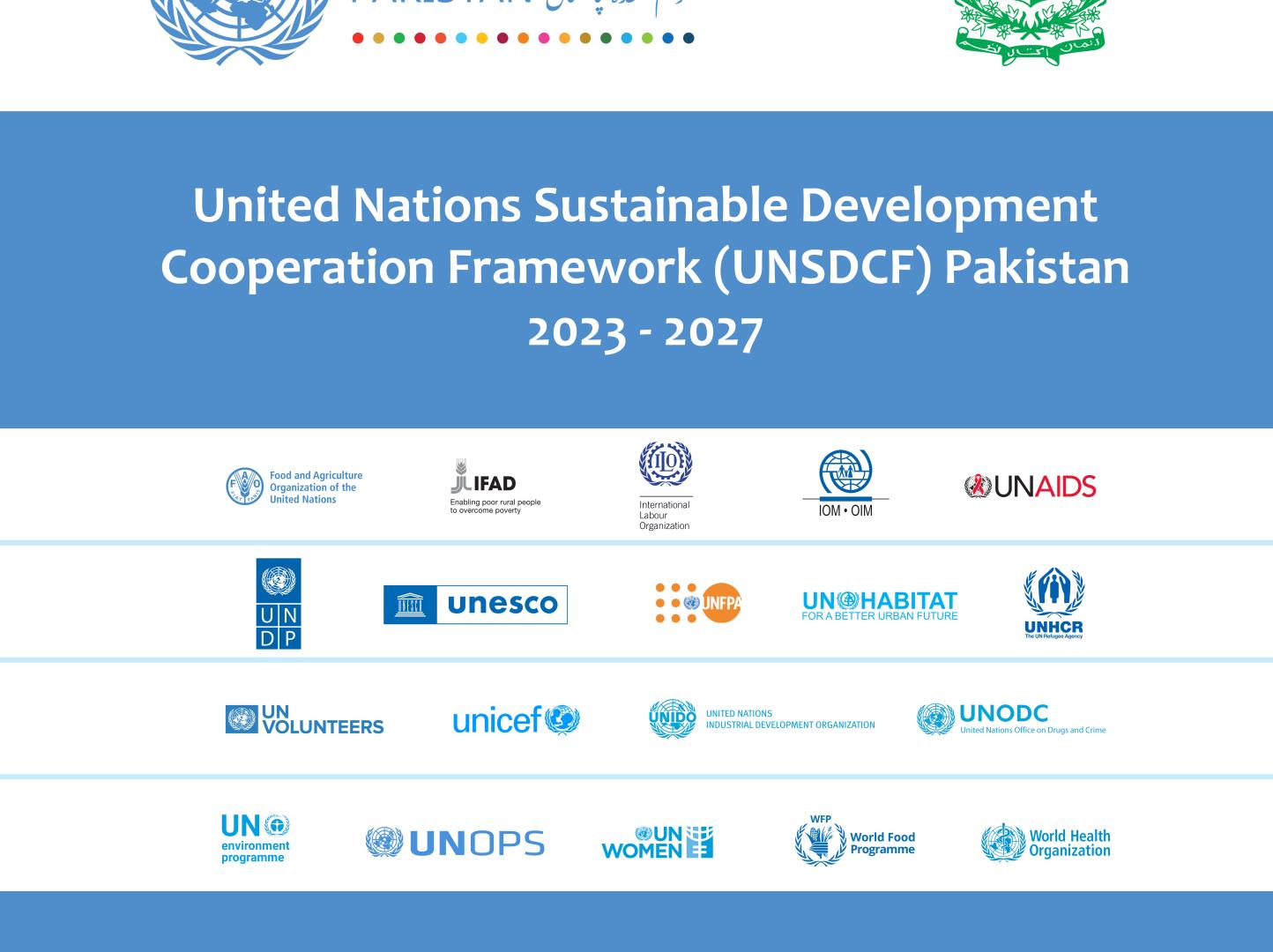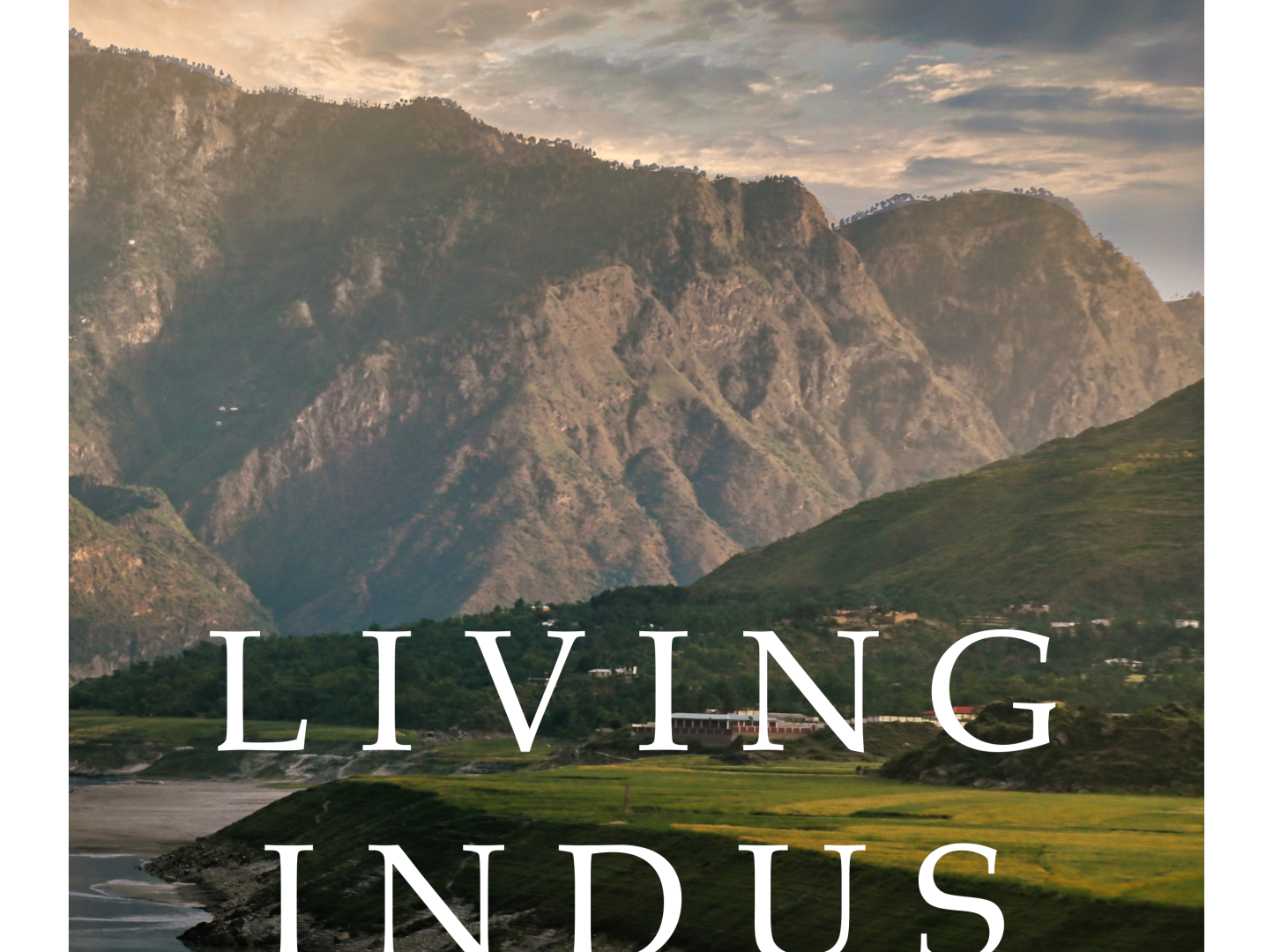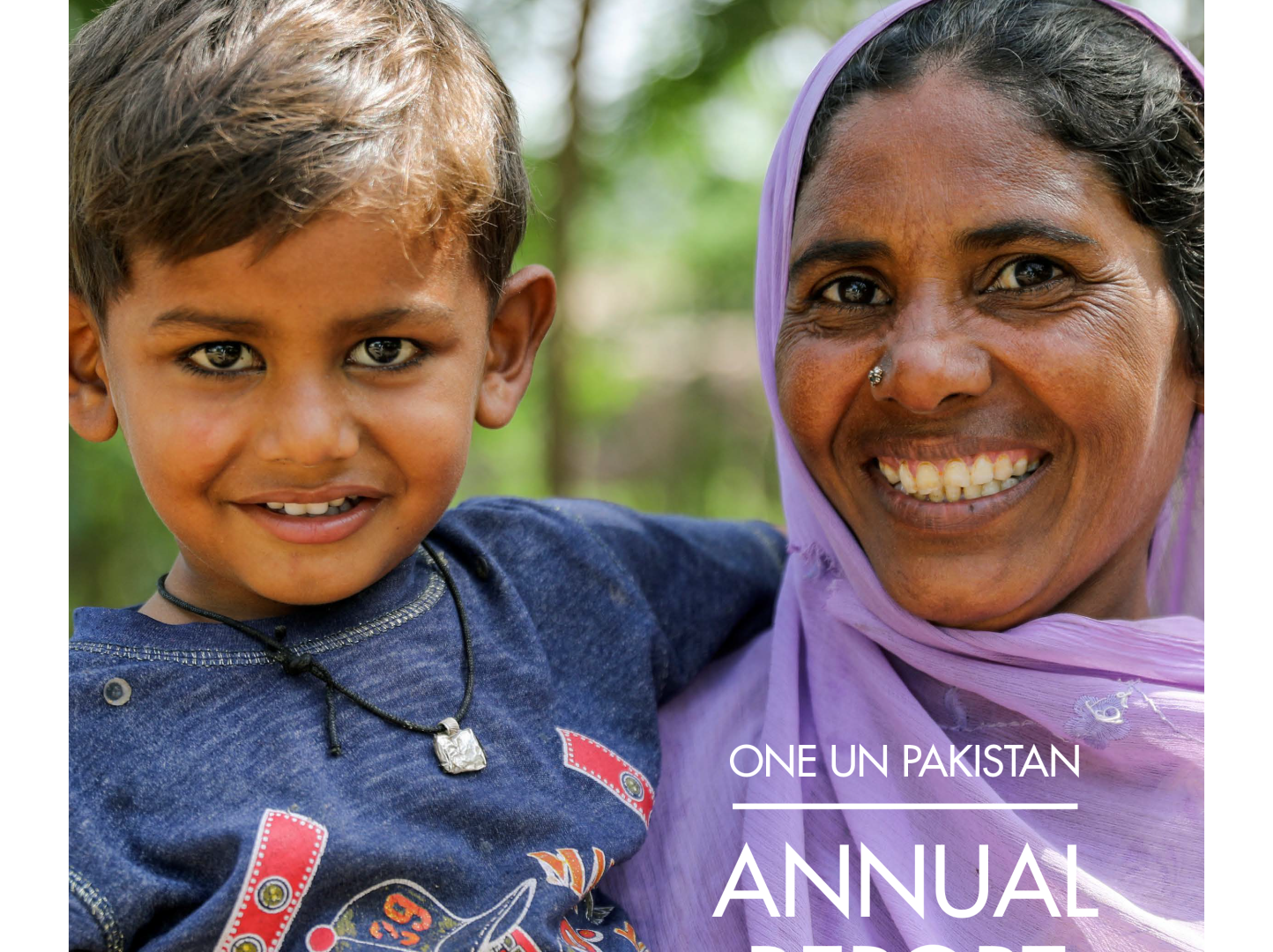Latest
Story
09 January 2026
Against the odds: Pakistan's health heroes protecting girls from cervical cancer
Learn more
Press Release
07 January 2026
Media Update: United Nations Pakistan, 5 January 2026
Learn more
Press Release
22 December 2025
Media Update: United Nations Pakistan, 19 December 2025
Learn more
Latest
The Sustainable Development Goals in Pakistan
Pakistan affirmed its commitment to the 2030 Agenda for Sustainable Development by adopting the Sustainable Development Goals (SDGs) as its own national development agenda through a unanimous National Assembly Resolution in 2016. Since then, the country has made considerable progress by mainstreaming these goals in national policies and strategies and developing an institutional framework for SDGs implementation in Pakistan. SDG support units have been established at federal and provincial levels with the planning institutions (Ministry of Planning Development and Special Initiatives and Provincial Planning and Development Departments) to guide SDGs implementation and monitoring it progress. In 2018, the Government designed and approved a National SDGs Framework that envisages a national vision to prioritize and localize SDGs. Localized provincial SDG Frameworks are being formulated. The focus of the government is on mainstreaming SDGs in planning processes, ensuring strong monitoring and reporting on SDGs, ensuring public financial allocations are aligned to SDGs and alternate financing modalities are being explored, and to benefit from use of technology to accelerate progress towards SDGs.
Publication
15 April 2025
Annual Report 2024
This annual report is proof positive that development works. It shows how the UN in Pakistan, together with our many partners, changed lives for the better in 2024. In words, numbers and images, this report outlines how our solutions for sustainable development sought to deliver the greatest impact for people in the greatest need.
1 of 5

Publication
15 January 2026
UNCT Pakistan Gender Strategy : 2025 – 2027
The UNCT Gender Strategy is a testament to the UN’s commitment to gender equality, equity and empowerment. It is aligned with the UN’s global mandate while, at the same time, tailored to respond to local needs. It has been developed by the Gender Theme Group (GTG), co-chaired by UNFPA and UN Women, with consultation, collaboration and input from all the UN agencies, funds and programmes working in Pakistan.
1 of 5

Publication
08 November 2022
United Nations Sustainable Development Cooperation Framework (UNSDCF) 2023-2027 for Pakistan
With this framework, the UN in Pakistan has prioritized five development outcomes to improve people’s lives in Pakistan, especially the lives of those at the greatest risk of being left behind. The UN will support Pakistan to move forward on its pathway towards sustainable development, on the understanding that:✓ If basic social services – including health, nutrition, water, sanitation and hygiene (WASH), education and social protection – are strengthened, there will be increased equal access to sustainable quality services for all.✓ If women, girls and transgender persons are empowered to reach their fullest potential, their human, social, economic and cultural rights will be fully protected and upheld, and they will have decision-making power over all aspects of their lives.✓ If the health of the Indus River Basin is restored and protected, and resources are equitably and efficiently used, the Indus will sustain a thriving civilization from its sources to the sea, and Pakistan will be much better equipped to adapt to climate change and mitigate its impact.✓ If there is sustainable and inclusive green economic growth and decent work, there will be equitable employment opportunities, enhanced productivity, a sustainable business environment and the realization of workers’ rights.✓ If inclusive, accountable and efficient governance systems are in place, they will provide equitable service delivery, affordable and accessible justice systems, and enable people to be aware of – and obtain – their rights.To download an abridged version: Click here
1 of 5
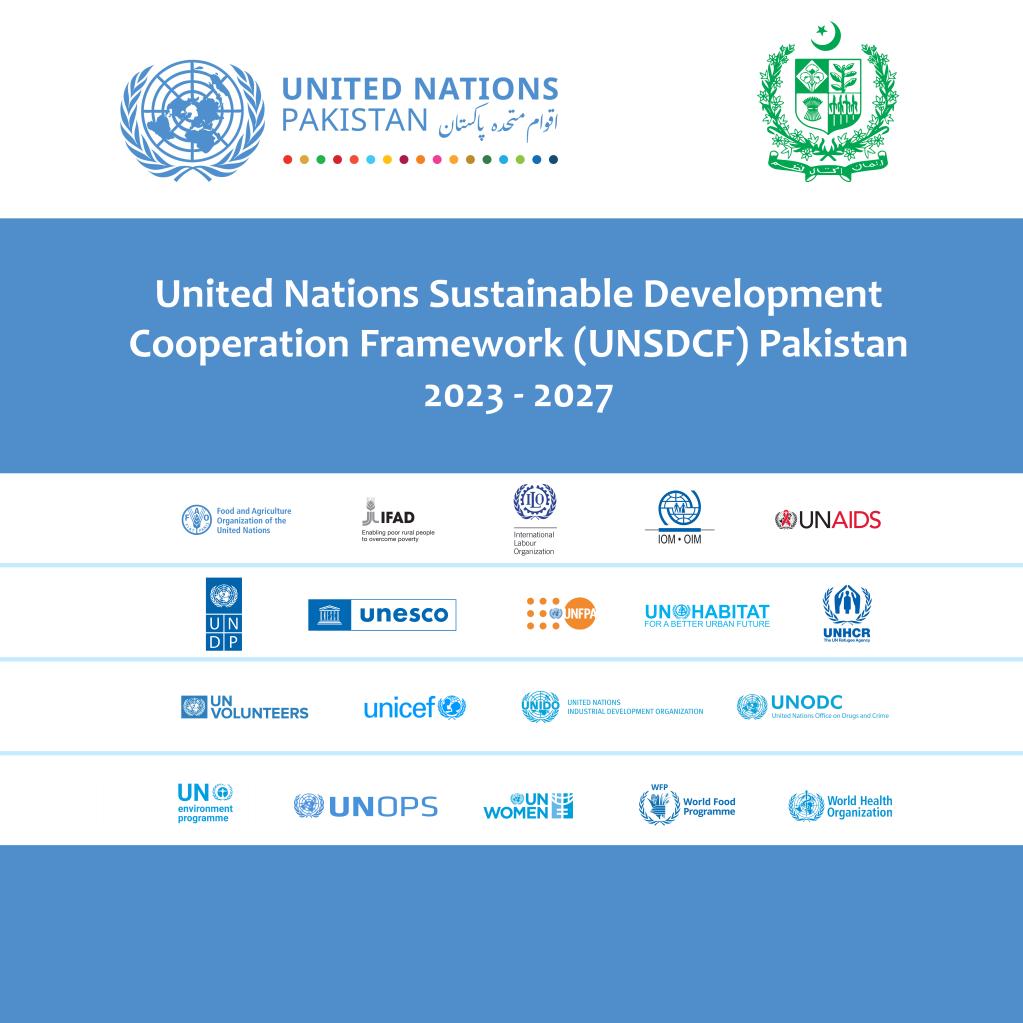
Publication
19 March 2025
CCA 2024 Update: CLIMATE FINANCING AND POLICY RECOMMENDATIONS
The UN Common Country Analysis (CCA) 2024 Update provides a comprehensive examination of Pakistan’s climate financing needs, challenges, and opportunities. With climate change posing an existential threat, the report highlights a staggering $348 billion financing gap required for mitigation and adaptation efforts by 2030.Despite being among the top 10 countries most vulnerable to climate change, Pakistan lags behind in international climate finance accessibility, with domestic private sector contributions remaining particularly low. The report identifies key barriers, including limited institutional capacity, slow disbursement rates, and reliance on debt-based climate finance, which further strain the country’s economic resilience.To address these gaps, the policy brief outlines strategic recommendations such as:· Developing a mid-term climate financing strategy,· Expanding domestic and international financing sources,· Enhancing governance frameworks, and· Strengthening disaster risk financing mechanisms.With climate inaction costs projected to reach $1.2 trillion by 2050, urgent and coordinated efforts are required from policymakers, financial institutions, and development partners to drive Pakistan’s transition toward sustainable and climate-resilient growth.
1 of 5
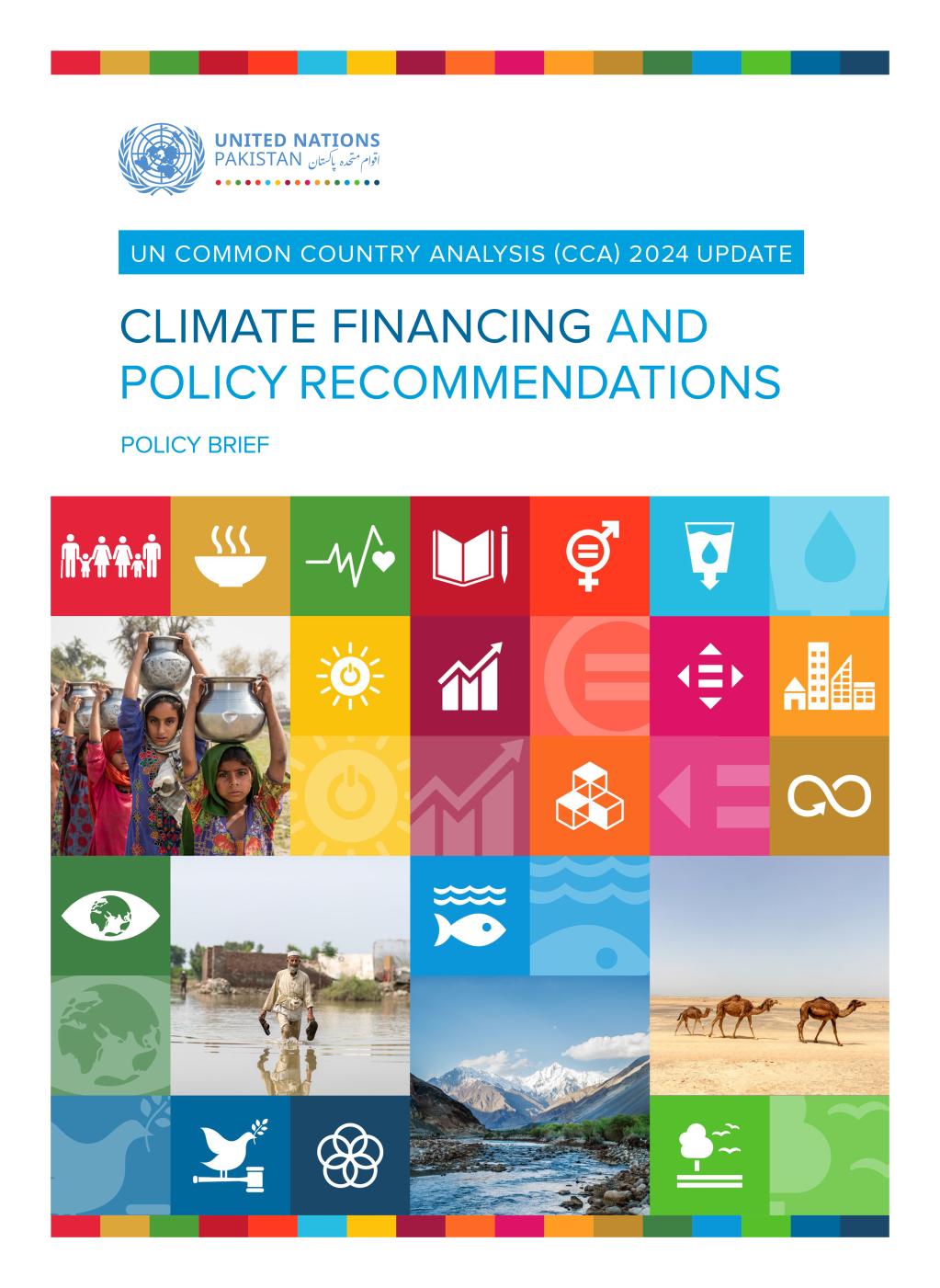
Publication
19 March 2025
Tax Compliance: Rationale and Behavioral Aspects of Taxpayer Motives (Zheng Hian and Shah Muhammad Azhar)
The objective of this policy brief is to provide an easy-to-digest overview of the factors affecting tax compliance in developing countries, including taxpayer motives at the micro level (Section II) and determinants of national tax capacities at the macro level (Section III), as well as a summary of policy options based on the discussion (Section IV). Section V describes the tax situation in Pakistan and discusses the main messages and insights of the policy brief for Pakistan.
1 of 5
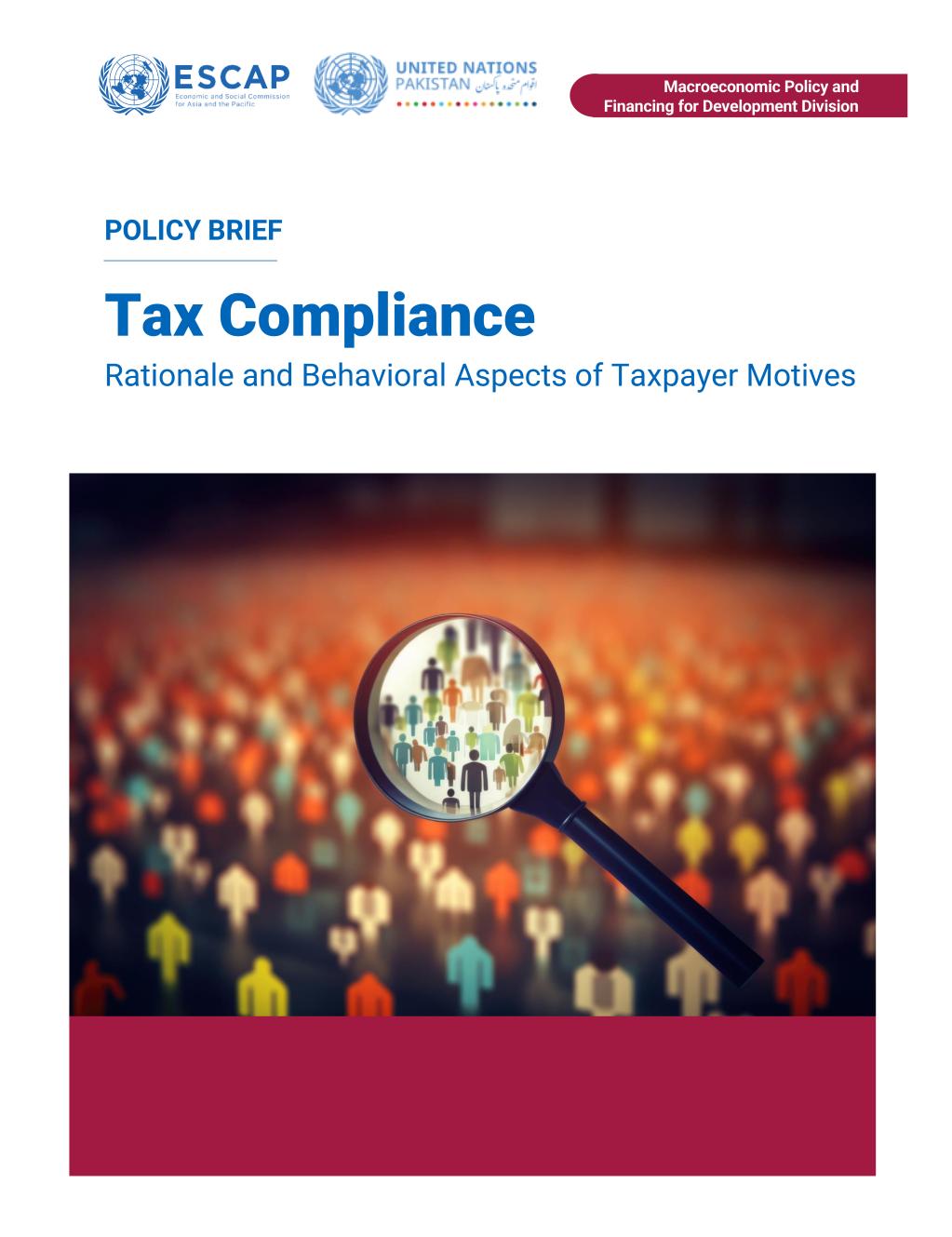
Story
09 January 2026
Against the odds: Pakistan's health heroes protecting girls from cervical cancer
Riffat, Saira, Shaheen, and Naheed are 4 of the 49 000 health workers trained with support from the World Health Organization (WHO) who implemented Pakistan's first-ever human papillomavirus (HPV) vaccination campaign to prevent cervical cancer in 2025, protecting over 9.6 million girls aged 9–14 years.As we mark cervical cancer awareness month, we celebrate their stories and their crucial contributions to the fight against a preventable disease that every year affects over 5000 women in Pakistan – killing 3200 of them (64%).By battling a disinformation storm to protect millions of girls and their future families, these frontline workers achieved a historic milestone in the nation’s public health journey. They became the heroes paving the way towards ending cervical cancer for millions of women.Riffat Naz: the planner who rewrote the planRiffat Naz, UCMO using the community map to discuss with her team members the number of girls to be vaccinated in each area and school. Photo credit: Ayesha Javed/ WHO Pakistan"Every single girl on our list is a daughter, a sister, a future leader. Our planning must be flawless to protect every one of them,” sayd Riffat Naz, a Union Council Medical Officer (UCMO) in Islamabad before the campaign began. Her team spent months conducting meticulous microplanning, creating maps and data sheets for a campaign largely focused on schools.However, reality quickly tested these plans. Riffat’s teams faced unexpected reluctance from school administrations and a high number of parents who, influenced by online misinformation, refused to provide consent. When school-based coverage remained significantly low, Riffat had to change the approach. Her new strategy focused on reaching girls outside the classroom, redeploying teams to reassure parents at their doorstep and covering out-of-school girls in communities and nomadic settlements. “Our initial plans were challenged daily, but with the support of government authorities we were able to adapt”.Saira Hassan: the social mobilizer on the frontline of misinformationSaira responds to mothers' questions during a community engagement session. Photo credit: WHO PakistanAs the campaign shifted from schools to households, the role of social mobilizers like Saira Hassan became even more critical. Her task was to counter misinformation circulating online by answering questions from parents and providing science-based facts to show that the WHO-prequalified vaccine is safe, life-saving, and effective, and has been successfully used in 150 countries – including Muslim countries – to protect girls from cervical cancer.“When I speak to a mother, I tell her this vaccine is safe and free, and is for the health of her daughter,” says Saira. With 7 years of experience, she used the trust built in her community to patiently counter the myths. This personal commitment was mirrored by staff at WHO, who vaccinated their own daughters and shared these moments on social media, creating a powerful, unified front against misinformation.Shaheen Akhter and Naheed Akhter: a team reassuring parents amidst doubtHealth workers Naheed and Shaheen during a training facilitated by WHO Pakistan. Photo credit: Hamid Inam/WHO Pakistan.For vaccinator Shaheen Akhter, being part of this historic first campaign was an honor. The intensive training supported by WHO had prepared her for the job. But the real test came in the field, where she and her team assistant, Naheed Akhter, faced parents filled with fear and doubt.While Shaheen focused on the vaccine, Naheed provided reassurance to parents and girls. “My job is to make sure everyone feels safe and cared for. A kind word and a smile can make all the difference,” Naheed says. Her reassuring presence was vital in calming anxious families. “I see my own daughters in the faces of these young girls,” she says.A new conversation, a ray of hopeTogether, Riffat, Saira, Shaheen, and Naheed represent the thousands of health workers who made the first vaccination campaign in Pakistan to prevent cervical cancer possible. While the 66% coverage rate achieved indicates that there is still work to be done, a ray of hope has emerged from the challenges. The campaign’s frontline workers have ignited a nationwide conversation on ending the public health threat of cervical cancer for millions of girls. Written by: Ayesha Javed - WHO Pakistan Edited by: José Ignacio Martín Galán - WHO Pakistan
1 of 5

Story
24 April 2025
Laila’s journey: crossing rivers and fields to vaccinate every child
“Children should complete their vaccinations, no matter where they live. To reach these locations, we travel on foot, often crossing fields. Sometimes we use a boat to cross rivers to ensure that no child misses a vaccination.” In the scorching heat of Ghazi Kot – a remote area of Muzaffargarh district – navigating the waters of the Indus River in a small boat, 24-year-old Laila Ashiq embarks with her vaccine carrier on a heroic mission to vaccinate every child and pregnant woman against preventable diseases, leaving no one behind. As one of only 12 female vaccinators in the district, Laila's commitment to her community of 60 000 individuals goes beyond her role as vaccinator for the Expanded Programme on Immunization (EPI) in Pakistan, a collaborative initiative supported by the World Health Organization (WHO). “When children are vaccinated, they stay healthy, contributing to a healthier society and helping to brighten the future of Pakistan,” says Laila. Laila, who lost her mother in 2021 and supports her 2 younger sisters while her father works as a ticket collector, embodies resilience and determination. Twice a week, Laila travels 25–30 km along a treacherous river route to reach hard-to-access villages. Driven by her unwavering belief that every life matters, Laila vaccinates women and children and educates mothers on the importance of regular vaccination and preventive care, helping to ensure that their children grow up healthy. "Vaccination is not just a choice, it's a responsibility that we share for the well-being of the children of our community. Through outreach and awareness-raising efforts, vaccinators transform indifference into a commitment to protect our children from preventable diseases like tetanus and measles”, says Laila. Laila vaccinates children against 12 fatal diseases including childhood tuberculosis, polio, diarrhoea, pneumonia, diphtheria, pertussis (whooping cough), tetanus, haemophilus influenzae type b, meningitis, typhoid, measles and rubella. “I felt relieved after the completion of the vaccination course for my son, knowing my child is protected now. For this I am grateful to Laila who not only informed me about the benefits of vaccination but also ensured I stayed on track with each dose,” said Rabia Bibi, mother of 3 children and a resident of Daddoo Mor village in Ghazikot.Laila’s dedication to outreach activities in geographically challenging regions is a testament to her commitment to improving health care services in the community. For her, having access to vaccinations is not a privilege, but a human right. “I believe that health is a fundamental right for every child, and this right cannot be taken away from them. Their vaccinations should be completed, no matter where they live.”
1 of 5

Story
24 April 2025
Pakistan: the women heroes of polio eradication
From vaccination campaigns to disease surveillance, women are at the forefront of the fight against polio across Pakistan, defying challenges, overcoming social norms, building trust and protecting the most vulnerable children from this lifelong paralytic disease. They are leading the way to run the last mile and end the global threat of polio.They are people like Ayesha Raza, a polio survivor who earned global recognition in 2024 for her dedication to fight this deadly disease, Bakht Roza and Basmina – who reach nomadic children in the harsh terrain of southern Khyber Pakhtunkhwa – and Dr Sarwat Wajahat Sheikh, whose efforts were recently recognized by the Government of Sindh. Ayesha, the polio survivor protecting Pakistani children from disability “It’s not easy for me to walk during polio campaigns due to my limited mobility, but I cannot miss the chance to bring hope and resilience to the children of Pakistan.”Polio eradication is a personal mission for Ayesha Raza, a Pakistani polio survivor and health worker whose remarkable commitment earned her global recognition at the Golden Jubilee Ceremony of the Islamic Development Bank – a polio eradication donor – which took place in Saudi Arabia in 2024.Every year, Ayesha is one of 400 000 vaccinators who go door-to-door to implement massive Government-led vaccination campaigns, supported by the World Health Organization (WHO) and partners, to protect over 45 million children against paralytic polio in Pakistan. Ayesha was 2 years old when she contracted polio in the 1990s, at a time when Pakistan did not have a dedicated polio programme. Since then, vaccinators like Ayesha have reduced the number of polio cases by 99.7%. With her left leg paralyzed and difficulty walking, Ayesha’s childhood was challenging. But she refused to let disability define her. She turned to a career as a health worker and also volunteered for the Pakistan Polio Eradication Programme.Ayesha works as a vaccinator and social mobilizer in Lahore, convincing hesitant parents to vaccinate their children to protect them from lifelong disability. “I eagerly await the day when polio is completely eradicated, bringing a brighter future for our nation and the world,” she says.Brave women on motorbikes to reach nomad children In the rough mountainous terrain of Lakki Marwat, two brave Pashtun women, Bakht Roza and Basmina navigate remote, security-compromised areas on motorbikes to vaccinate children against 12 deadly diseases, including polio. Working in Bettani subdivision, where health services are scarce, they are the sole source of essential immunization for children and expectant mothers.Deployed under the Nomads Vaccination Initiative – launched in 2022 to vaccinate nomadic children who often miss polio and routine vaccinations due to frequent movement – Bakht Roza and Basmina travel long distances and overcome cultural barriers to protect children from terrible diseases. They have vaccinated nearly 2800 children, convinced over 200 refusal families to accept immunization, and administered tetanus vaccinations for pregnant women who had not received vaccinations at the local health facility because only a male vaccinator was available. Braving harsh terrain, falls from bikes and community resistance, they remain steadfast. “We think of all the children in the community who need our help as our own children and that motivates us to keep going,” says Bakht Roza.Their story is a testament to the resilience and dedication of female vaccinators who ensure that every child has the chance for a healthy future. WHO Disease Surveillance Officer Recognized for Breakthrough Case Detection “As a public health worker, a polio-free Pakistan is my highest priority and a dream to realize.”Making Pakistan polio-free is a priority for Dr Sarwat Wajahat Sheikh, a WHO Disease Surveillance Officer in Karachi’s Malir district. Her hard work and exceptional commitment to identifying and investigating polio cases in her district was recognized by the Government of Sindh on World Polio Day 2024. In 2017, Dr Sarwat joined WHO in Sindh’s Dadu district where she played a key role in strengthening poliovirus and vaccine-preventable disease surveillance. In 2021, she was transferred to Karachi where the dense population, frequent migration and pockets of vaccine resistance, especially in underserved communities, make poliovirus circulation a persistent challenge. In Karachi Dr Sarwat contributed to expanding the number of surveillance sites from 43 to 93 and mobilized 152 community informants to improve polio case detection. In 2024, she faced one of her toughest cases in Ibrahim Hyderi, a slum community of labourers and fishermen, where a child – suspected of having polio – had unfortunately passed away. The family was hesitant to cooperate with the Pakistan Polio Programme’s case investigation teams. Undeterred, Dr Sarwat spent weeks building trust with the parents, ultimately convincing them to let the teams collect stool samples from other children in the family to rule out polio. Her efforts led to confirmation of the first polio case in the area in 10 years, triggering an urgent vaccination response to protect all children in the community. Dr Sarwat’s work earned her special recognition from the Government of Sindh. “Disease surveillance is a powerful tool to level the playing field, to bend the arc of our country away from poliovirus and towards a polio-free Pakistan”.
1 of 5

Story
24 April 2025
Fatima: crossing deserts to protect mothers and newborns in Pakistan
"Fatima is not just a health worker. She is an angel who brought light back into my life."The words are Maloka’s, a young mother from a remote village in Tharparkar, Sindh province, who lost her first child to neonatal tetanus. When Maloka became pregnant again, Fatima, a Lady Health Worker, vaccinated her against tetanus, ensuring that both the mother and newborn would be protected.Maloka’s story highlights how the Government of Pakistan, in partnership with the World Health Organization (WHO), has transformed the prevention of maternal neonatal tetanus (MNT) across the country. Around 80% ofPakistan’s population (190 million people) now live in areas where the spread of neonatal tetanus is under controlled limits – less than 1 case of tetanus per 1000 live births. Islamabad Capital Territory and Pakistan-administered Kashmir achieved elimination in March 2025, Sindh in December 2024 and Punjab in 2016.Fatima, Maloka’s “angel”, is one of 17 000 Lady Health Workers deployed in the province of Sindh, and 30 000 across the country. For mothers like Maloka, Lady Health Workers are heroes, but they do not work alone. More than 140 000 Lady Health Visitors, Lady Health Supervisors, Lady Health Workers and midwives work across Pakistan, covering even the most remote areas, keeping mothers and newborns safe. Maloka lost her first child, a baby girl, to neonatal tetanus. The pain of that loss fueled her determination to protect any future children. When Maloka became pregnant again, Fatima was there, a steady source of support and guidance. She ensured Maloka received the necessary tetanus vaccinations, advised her on safe delivery practices and provided antenatal care. Today, Maloka cradles her healthy 1-year-old son, a symbol of hope and resilience. Maloka's story underscores the crucial role of frontline health workers like Fatima who provide advice from mother to mother. Fatima acts as a bridge between communities and the health care system, building trust and empowering women to take control of their health. Despite progress, Pakistan remains among 10 countries worldwide that have yet to eliminate MNT. In 2024, a total of 322 cases and 6 deaths were reported across the country, though WHO experts estimate that only 30% of cases are notified to the authorities. WHO will continue to partner with Pakistan and its frontline health workers as they work to eliminate MNT from the country and protect future generations from this preventable disease. As the sun sets over the Thar desert, casting long shadows across the sand dunes, health workers like Fatima are bringing hope for a healthier future to the most remote settlements. “Initially, it was an uphill battle,” Fatima recalls. “Many were hesitant, bound by traditional beliefs and misconceptions about vaccines. Now, the smiles of healthy babies and the relief in mothers' eyes are the greatest reward. It is a reminder that, even in the most challenging circumstances, we can make a difference, one vaccine at a time.”
1 of 5

Story
03 April 2025
Jalwa: fighting tuberculosis on Pakistan’s frontlines
"I am thankful to WHO for providing me with a platform from which I can utilize my abilities to work for the welfare of my people.”Jalwa Ali works for the World Health Organization (WHO) in Pakistan, supporting the provision of services to people affected by tuberculosis (TB) at the Women & Children Hospital Rajjar Charsadda in Khyber Pakhtunkhwa Province. Jalwa works on the frontlines visiting patients, raising awareness, gaining the trust of female patients and communities, addressing misconceptions and reducing the stigma associated with the disease. TB affects over 686 000 people and causes 47 000 deaths annually in Pakistan. The country bears 73% of the TB burden in the Eastern Mediterranean Region and is the 5th most affected in the world.TB can have severe consequences for women, especially during their reproductive years and pregnancy. In partnership with WHO, the Provincial and District TB programme and the Reproductive, Maternal and Newborn (RMNCH) programme are working to implement TB screening for antenatal and postpartum women at the Women & Children Hospital Rajjar Charsadda. WHO also supports the use of GeneXpert testing of stool specimens from young children. The hospital serves a population of 1.6 million and provides outpatient services to over 9800 people each month, including pediatrics (4900), gynaecology (4137), pediatric neonatology (419) and general surgery (394). “I am thankful to the doctors and staff at the hospital who helped me in the diagnosis and treatment of TB,” said Fatima, an antenatal patient who visited the hospital with a 4-day cough. After receiving treatment, she delivered normally and is now fully recovered. Pakistan has increased TB notifications and treatment coverage, reaching nearly 495 000 people in 2024 (70% of the affected population), compared with 331 800 people in 2015 (57% of the affected population). Over the last decade, in partnership with WHO, Pakistan has provided diagnosis and treatment services to 3.7 million people affected by TB.Despite progress, diagnosing TB in children and pregnant women remains a challenge due to factors such as a lack of information, stigma and hesitation among affected populations. Jalwa works hard informing women about the importance of being tested for TB, a disease that is curable and preventable. Being from the same area as her patients is her biggest asset. Women feel comfortable sharing their health concerns with her. For Jalwa, fighting tuberculosis forms part of her personal commitment to serve her community.“I am passionate about making a difference in the lives of vulnerable populations, and am particularly interested in fighting tuberculosis because of its impact on marginalized communities. I realized that there is a dearth of awareness about tuberculosis among local communities, leading to misconceptions. Ending tuberculosis is now my life’s mission.”
1 of 5
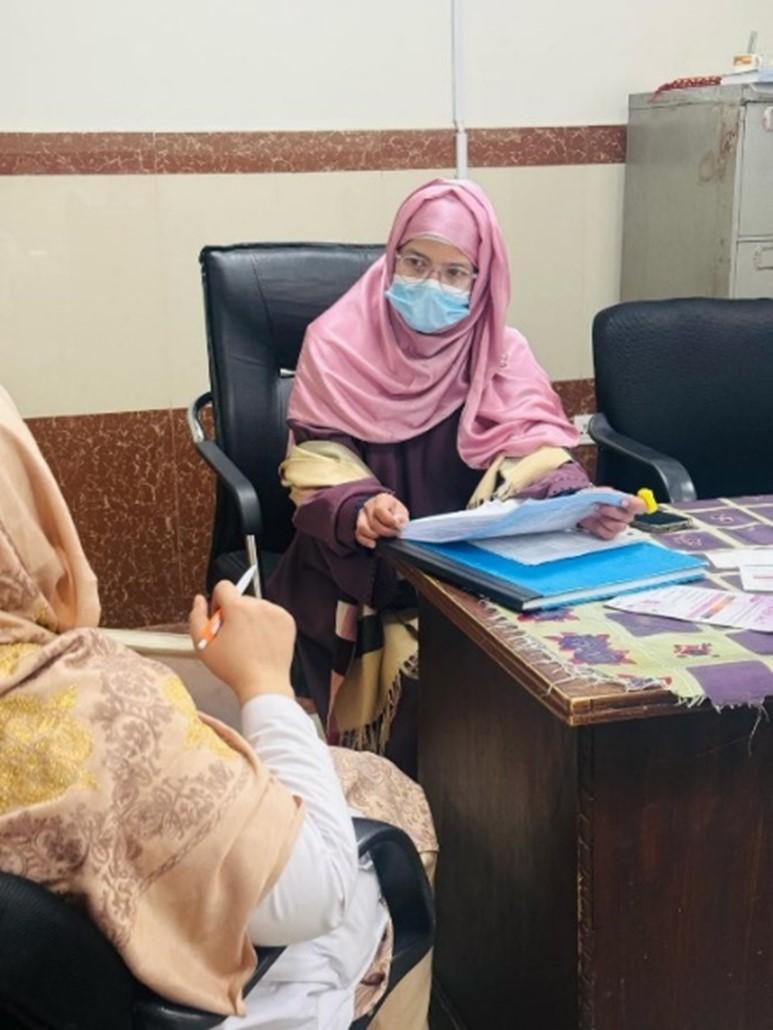
Press Release
07 January 2026
Media Update: United Nations Pakistan, 5 January 2026
Murree Pakistan - 30 December 2025: The United Nations Office for Project Services (UNOPS) and the Health Services Academy (HSA), Government of Pakistan, signed a Memorandum of Understanding (MoU) to establish a framework for strategic collaboration in public health innovation, research, and health system strengthening.The MoU was signed during the Dialogue Session on ‘Strengthening Health Procurement Systems in Pakistan,’ convened by UNOPS, with participation from health experts and representatives of the Ministry of National Health Services, Regulations & Coordination (MoNHSRC), the Common Management Unit (CMU), and the Health Services Academy (HSA). The session aimed to identify key challenges, opportunities, and practical solutions to strengthen health procurement and supply chain systems in PakistanThe partnership underscores a shared commitment to advancing sustainable, resilient, and accessible health systems through joint research, capacity building, innovation, and implementation support. The collaboration aligns with national health priorities, contributes to health system strengthening and universal health coverage, and advances the SDGs. It also provides a platform for joint proposal development, resource mobilization, and knowledge exchange to support evidence-based health policies and programs in PakistanDr. Shahzad Ali Khan, Vice Chancellor of the Health Services Academy, emphasized the importance of this synergy, stated:“As Pakistan’s national public health institution, HSA is committed to addressing public health challenges through research, education, and policy advisory. This MoU with UNOPS marks a key step in advancing innovative solutions to strengthen health systems, prevent disease, and improve health outcomes nationwide”.Jennifer Ankrom, Country Manager of UNOPS Pakistan, highlighted the United Nations commitment to advancing Health systems, saying:“UNOPS is committed to advancing Pakistan’s health systems. This collaboration combines UNOPS’ operational expertise with HSA’s academic strengths to drive innovation, strengthen health procurement, and build capacity to deliver quality services, especially for the most vulnerable, and thanks the Ministry of NHSR&C for their continued trust in UNOPS to advance key national health priorities”.The partnership marks a significant milestone in fostering coordinated action, knowledge sharing, and innovation to support sustainable advancements in public health and health system performance in Pakistan.For more information, contact Wajid Zahid at wajidz@unops.org or +92 346 8557760
1 of 5
Press Release
22 December 2025
Media Update: United Nations Pakistan, 19 December 2025
Islamabad, 18 December 2025 — The Government of Japan, through the Japan International Cooperation Agency (JICA), and the United Nations Development Programme (UNDP), in partnership with the Government of Khyber Pakhtunkhwa (KP), have launched a new initiative titled “The Project for Development of Public Service Infrastructure in the Merged Districts of Khyber Pakhtunkhwa” to strengthen local governance and improve access to essential public services in KP’s Merged Districts. Implemented under UNDP’s Merged Areas Governance Programme (MAGP), the partnership was formalized through a signing ceremony in Islamabad.Following their merger with KP in 2018, the Merged Districts are undergoing a critical transition toward decentralized governance and localized service delivery. While notable progress has been made, newly established local systems continue to cope with the adjustments required by the merger, needing support to strengthen administrative mechanisms, improve civil response and expand access to basic public services. This project aims to address these gaps by strengthening the institutional capacity of the first-ever elected Tehsil Local Governments (TLGs) to deliver essential public services and promote community-responsive governance.With a contribution of 518 million Japanese Yen (approximately US$3.5 million), the project will support 19 TLGs across eight Merged Districts to deliver essential services through small-scale infrastructure schemes, directly benefiting approximately 18,000 people and indirectly reaching an estimated 500,000 community members. Working closely with local administrations, the initiative will help identify and implement community-driven projects based on local needs, strengthening coordination, accountability, and community engagement.The signing ceremony brought together senior representatives from the Ministry of Economic Affairs, Government of KP, the Embassy of Japan, JICA, and UNDP, reflecting a shared commitment to improving service delivery and local governance in a region with historically limited exposure to formal administrative systems.Addressing the ceremony, H.E. Mr. AKAMATSU Shuichi, Ambassador Extraordinary and Plenipotentiary of Japan to the Islamic Republic of Pakistan, said: “We see that the merged areas are the one of the most challenging, yet a very key entry point that will bring sustainable peace and development to the province as well as the country of Pakistan. This project will not only support the recovery of essential community infrastructure and local service delivery, but also foster inclusive and participatory local governance to ensure the whole of society approach toward the outcomes.”Mr. NAKATSU Masaaki, Senior Representative of JICA Pakistan Office, added: “As the JICA’s technical cooperation project for TLGs (2022-2026) has formulated Tehsil Development Plans through a participatory approach, this new project - collaboration between UNDP and JICA, will play a crucial role in implementing these Plans and responding to the needs of local communities. We are confident that this project is not merely about implementing infrastructural schemes, but also about promoting mutual trust between local governments and communities, thereby strengthening the foundation for sustainable development in the region.”The initiative builds on the JICA’s technical cooperation project for Strengthening Capacity of Local Government Officers in Newly Merged Districts in KP, which identified locally prioritized schemes through participatory approach.Speaking at the occasion, Mr. Mahmood Khan, Joint Secretary (UN), Ministry of Economic Affairs, Government of Pakistan, highlighted: “The Merged Districts present both complex challenges and opportunities for Khyber Pakhtunkhwa. By strengthening local governments for improved service delivery, this project supports our vision of sustainable development, unlocking the potential of local communities as key drivers for achievement of the Sustainable Development Goals (SDGs).”Dr. Ehtisham-ul-Haq, Chief International Development Section, Planning & Development Department, Government of KP, remarked: “We whole-heartedly welcome the support of Government of Japan and UNDP - two of our most steadfast partners in the Merged District’s development journey, and are confident that together we can make tangible progress in improving service delivery, local institutions, and public trust in the region.”Aligned with UNDP’s five-year strategy for inclusive and accountable governance in Pakistan, the project also supports provincial and federal governments’ development plans for the Merged Districts, including the Tribal Decade Strategy and Accelerated Implementation Programmes I & II.Speaking at the ceremony, Dr. Samuel Rizk, Resident Representative for UNDP Pakistan, said: “This is our commitment in action: to deliver services to communities that need them most, strengthen institutions that endure, and rebuild trust where it matters most. With the support of the Government of Japan and JICA and working closely with the Government, we are translating this commitment into concrete plans and steady progress that delivers tangible change for the people of the Merged Districts.” ### ### ### Contact Details:
For additional information, contact Fizza Bangash, Head of Communications, UNDP, at fizza.bangash@undp.org or +92 (51) 835 5631 About UNDP:UNDP is the leading United Nations organization fighting to end the injustice of poverty, inequality, and climate change. Working with our broad network of experts and partners in 170 countries, we help nations to build integrated, lasting solutions for people and the planet.Learn more at undp.org or follow at @UNDP
For additional information, contact Fizza Bangash, Head of Communications, UNDP, at fizza.bangash@undp.org or +92 (51) 835 5631 About UNDP:UNDP is the leading United Nations organization fighting to end the injustice of poverty, inequality, and climate change. Working with our broad network of experts and partners in 170 countries, we help nations to build integrated, lasting solutions for people and the planet.Learn more at undp.org or follow at @UNDP
1 of 5
Press Release
16 December 2025
Media Update: United Nations Pakistan, 15 December 2025
ILOPRESS RELEASE Khyber Pakhtunkhwa launches Integrated Beneficiary Registry to strengthen social protection deliveryThe Integrated Beneficiary Registry will support improved coordination, efficiency and transparency across social protection programmes in the province.PESHAWAR, Pakistan (ILO News) – The launch of the Social Protection Integrated Beneficiary Registry (IBR) today marks a key step toward strengthening the coordination and delivery of social protection programmes in Khyber Pakhtunkhwa. Participants at the launch event underscored the role of integrated systems in reducing duplication, improving targeting and enabling more effective, data-driven social protection services across the province.The initiative is led by the Public Policy and Social Protection Reforms Unit within the Planning & Development Department of the Government of Khyber Pakhtunkhwa, with technical support from the ILO and GIZ, funded by the German Federal Ministry for Economic Cooperation and Development (BMZ) and European Union (EU), under the Digital Convergence Initiative (DCI).The Integrated Beneficiary Registry will function as a centralized database that consolidates information on individuals and households receiving benefits from multiple social protection programmes. By linking data through a unique citizen identifier, the system will enable authorities to better understand who is receiving which benefits, when and where, supporting improved service delivery and coordination across programmes.The launch event, held in Peshawar, brought together provincial political leadership, senior government officials, and representatives from key provincial and federal social protection institutions. Faisal Khan Tarakai, Honourable Minister for Labour, Government of Khyber Pakhtunkhwa, attended the event as Chief Guest.Geir Thomas Tonstol, Country Director of ILO Pakistan, stated that “Integrated beneficiary registries are a critical foundation for modern, effective and inclusive social protection systems. By strengthening coordination across programmes and improving the use of data, the Integrated Beneficiary Registry in Khyber Pakhtunkhwa will help ensure resources are used more efficiently and that support reaches those who need it most.”Faisal Khan Tarakai, Minister for Labour, Government of Khyber Pakhtunkhwa, underscored that “By bringing labour-related schemes into a unified provincial framework, the Integrated Beneficiary Registry will allow us to better understand coverage gaps, improve coordination across programmes, and strengthen targeting. This will help ensure that workers and vulnerable households receive timely and effective support, while enabling more informed, evidence-based decision-making. The Government of Khyber Pakhtunkhwa appreciates the continued technical support of the ILO in advancing social protection reforms in the province.”The launch also featured a panel discussion on “Digital Transformation of Social Protection in Khyber Pakhtunkhwa: Current Progress and Future Priorities.” Participants highlighted how integrated social protection information systems can enhance efficiency, accuracy, accountability and citizen empowerment. The IBR is developed under the ILO’s Digital Convergence Initiative (DCI) framework and aims to support more proactive and data-driven delivery of social protection programmes.Concluding the event, Khalid Khan, Director General, Social Development Unit (SDU), reaffirmed the Government of Khyber Pakhtunkhwa’s commitment to institutionalizing an integrated and interoperable social protection framework to enhance efficiency, transparency and impact across the province.Designed as both an analytical and operational tool, the Integrated Beneficiary Registry will support planning, monitoring and coordination across social protection programmes. It will also serve as a key tool for coordinating the supply side of social protection, enabling data-driven policy decisions and strengthening transparency and accountability in the allocation of public resources. By enabling comprehensive analytics, the system will help identify coverage gaps, strengthen targeting, and improve overall system performance.For further information please contact:Muhammad Numan, Communication Officer, Email: numan@ilo.orgMobile: +92 303 5000041 FAOPRESS RELEASEFAO and Agriculture Department Celebrate KP’s First-Ever Commercial Ginger HarvestPeshawar, Khyber Pakhtunkhwa – 15 December 2025 — Khyber District has marked a historic milestone today: the successful harvest of high-quality ginger grown locally for the first time. A crop Pakistan has always imported is now being produced by farmers in KP — opening the door to a new billion-rupee opportunity for the region.The harvest was celebrated in Peshawar in the presence of FAO’s Acting Representative in Pakistan, senior officials from the KP Agriculture Department, researchers from ARS KP and NARC Islamabad, district authorities, community leaders, and farmers.The success of the pilot did not happen by chance — it was the result of several important factors coming together at the right time. Farmers received good-quality seed from a trusted private-sector partner, and FAO trained them through its Farmer Field School approach, giving them the skills to handle a completely new crop. Throughout the season, FAO, ARS, and Agriculture Extension teams provided continuous technical guidance, while farmers themselves showed strong motivation and ownership. The natural conditions in Bara — favourable climate and soil — further supported the crop’s performance, and the relatively low entry cost made ginger an attractive option for smallholders. The private sector remained actively engaged throughout, creating opportunities for learning and future market linkages.When all these dots connect — seed, skills, support, climate, and private-sector engagement — a value chain begins to take shape. Ginger is now proving exactly that in KP.Speaking at the event, James Okoth, FAO’s Acting Representative in Pakistan, said:
“This pilot shows what becomes possible when everyone works together — farmers, researchers, extension teams, and the private sector. When farmers get good seed, adequate training, and timely guidance, and when the environment supports it, a new crop can really take off. Ginger is now showing great promise for Khyber and beyond.”FAO guided farmers step by step through the entire season, helping them prepare, plant, and manage the crop. Exposure visits to Punjab gave them the reassurance that they, too, could succeed.A farmer shared: “We had never grown ginger before. FAO supported us from day one and stayed with us throughout the season. Now the crop has succeeded, and we are confident to expand and even share seed with other farmers. This is a game changer for us.”A High-Value Opportunity for PakistanPakistan imported USD 42.7 million worth of ginger in 2023. With successful yields now demonstrated in KP:farmers can earn far more compared to traditional cropsthe country can reduce its reliance on costly importsnew value chains and rural employment — especially for women and youth — can emergeGinger also shows strong potential for value addition, including dry ginger, powder, pastes, and seed multiplication.Scaling Up Across KPEncouraged by the pilot’s success, the KP Agriculture Department and FAO are planning to expand ginger cultivation to three additional merged districts. Continued collaboration with ARS KP, NARC, Agriculture Extension, and private-sector actors will guide the next phase. There is also potential for related high-value crops like turmeric, and for establishing local seed systems and community-level processing units.A New Chapter for Farmers in KhyberThis successful pilot has shown that with the right support, Khyber District can grow high-value, climate-resilient crops that raise incomes and strengthen rural livelihoods.Ginger is no longer just an imported product — it is now a homegrown success story for KP.Affsheen Yousaf
Communications Specialist, FAO Pakistan
affsheen.yousaf@fao.org | 0321-8586555Facebook: www.facebook.com/FAOinPakistan
Twitter: https://twitter.com/FAOPakistan
Website: www.fao.org/Pakistan
“This pilot shows what becomes possible when everyone works together — farmers, researchers, extension teams, and the private sector. When farmers get good seed, adequate training, and timely guidance, and when the environment supports it, a new crop can really take off. Ginger is now showing great promise for Khyber and beyond.”FAO guided farmers step by step through the entire season, helping them prepare, plant, and manage the crop. Exposure visits to Punjab gave them the reassurance that they, too, could succeed.A farmer shared: “We had never grown ginger before. FAO supported us from day one and stayed with us throughout the season. Now the crop has succeeded, and we are confident to expand and even share seed with other farmers. This is a game changer for us.”A High-Value Opportunity for PakistanPakistan imported USD 42.7 million worth of ginger in 2023. With successful yields now demonstrated in KP:farmers can earn far more compared to traditional cropsthe country can reduce its reliance on costly importsnew value chains and rural employment — especially for women and youth — can emergeGinger also shows strong potential for value addition, including dry ginger, powder, pastes, and seed multiplication.Scaling Up Across KPEncouraged by the pilot’s success, the KP Agriculture Department and FAO are planning to expand ginger cultivation to three additional merged districts. Continued collaboration with ARS KP, NARC, Agriculture Extension, and private-sector actors will guide the next phase. There is also potential for related high-value crops like turmeric, and for establishing local seed systems and community-level processing units.A New Chapter for Farmers in KhyberThis successful pilot has shown that with the right support, Khyber District can grow high-value, climate-resilient crops that raise incomes and strengthen rural livelihoods.Ginger is no longer just an imported product — it is now a homegrown success story for KP.Affsheen Yousaf
Communications Specialist, FAO Pakistan
affsheen.yousaf@fao.org | 0321-8586555Facebook: www.facebook.com/FAOinPakistan
Twitter: https://twitter.com/FAOPakistan
Website: www.fao.org/Pakistan
1 of 5
Press Release
08 December 2025
Media Update: United Nations Pakistan, 5 December 2025
4 December 2025, Quetta: After a resounding success in Khyber Pakhtunkhwa, under the European Union (EU) funded ‘Deliver Justice Project’, the Balochistan Bar Council and the United Nations Development Programme (UNDP) partnered to bring the second annual Women Lawyers Conference to Balochistan, gathering over 85 women lawyers from across the province.Commemorating 16 Days of Activism against online abuse, this year, the Conference discussed the challenges and opportunities for “Women Practicing Law in the Digital Era and the Age of AI” with a special focus on Technology Facilitated Gender Based Violence (TFGBV). TFGBV is gender-based violence that is perpetrated through phones, social media, or other digital spaces. Mr. Rahib Khan Buledi, Vice Chairperson, Balochistan Bar Council, took this opportunity to underline that, “The annual Women Lawyers Conference has become a key platform aligning the needs of women as users and service providers of the justice system with the Bar Council’s efforts. This year’s theme strengthens the Conference’s role in preparing women lawyers for emerging risks, digital realities, and new avenues of legal practice.” He thanked the EU and the UNDP for their steadfast partnership in making the justice sector safer and more accessible for women.The Conference included an orientation session on the preliminary findings of UNDP’s diagnostic research on TFGBV, raising awareness about online abuse targeting women, girls, and marginalized groups. This was followed by a panel discussion on ‘Confronting TFGBV’ led by Mr. Zulfiqar Durrani, Head of UNDP Sub-Office Balochistan, with panelists Ms. Sabira Islam, former Ombudsperson, Balochistan; Mr. Sardar Qadeer, Advocate, Sardar Qadeer Law Associates; Ms. Fauzia Shaheen, ex-Chairperson, Balochistan Commission on the Status of Women; and Ms. Farzana Khilji, Advocate. Discussions focused on the nature of TFGBV cases, gaps in the legal framework, evidence collection, and steps to create safer online spaces for women, girls, and marginalized groups.Congratulating the Balochistan Bar Council, and UNDP on milestones achieved under the EU-funded ‘Deliver Justice Project,’ Mr. Jeroen Willems, Head of Cooperation, EU Delegation to Pakistan, highlighted, “AI and ICT bring many advantages, but they also introduce challenges and pitfalls such as Technology-Facilitated Gender-Based Violence (TFGBV). We are proud to support women lawyers to address these challenges, strengthen access to justice, enhance representation, and break long-standing barriers.”At the close of the Conference, women lawyers agreed on recommendations to build safer workplaces and a justice sector equipped to meet the emerging challenges in the age of AI.Ms. Van Nguyen, Deputy Resident Representative, UNDP Pakistan, shared a special message for women lawyers. “Let this gathering not end in words – let it end in commitment. Commitment to challenge injustice wherever it lives and to stand beside every woman whose voice still waits to be heard.” She thanked the Balochistan Bar Council for supporting women’s advancement and the EU for joining UNDP on this journey.Contact Details:For additional information, please contact: Fizza Bangash, Head of Communications at UNDP Pakistan, at fizza.bangash@undp.org. About the Deliver Justice Project:The 20 Million Euro “Deliver Justice Project”, is funded by the European Union and aims to support reform processes to ensure the delivery of people-centered justice, enhance access to justice for all, particularly women and less privileged groups, and improve service delivery of the security sector in line with constitutional safeguards and international standards in Khyber Pakhtunkhwa including the Merged Districts and Balochistan. The project is funded by the EU and jointly implemented by the United Nations Development Programme (UNDP), the United Nations Entity for Gender Equality and the Empowerment of Women (UN Women), and the United Nations Office on Drugs and Crime (UNODC).The UNDP Rule of Law Programme is implementing a range of interventions to enhance security and justice sector governance in Pakistan.About UNDP:UNDP is the leading United Nations organization fighting to end the injustice of poverty, inequality, and climate change. Working with our broad network of experts and partners in 170 countries, we help nations to build integrated, lasting solutions for people and planet.
1 of 5
Press Release
08 December 2025
Media Update: United Nations Pakistan, 4 December 2025
THE SECRETARY-GENERAL MESSAGE FOR INTERNATIONAL VOLUNTEER DAY FOR ECONOMIC AND SOCIAL DEVELOPMENT5 December 2025In an era of political division and social isolation, volunteering offers a powerful way to forge connections and foster our shared humanity.On this International Volunteer Day, we honour the millions across the globe stepping forward to serve their communities and advance the greater good.This year’s theme, “Every Contribution Matters,” reminds us that everyone has something meaningful to offer, and that every cause, from hunger, to climate, to humanitarian action, benefits from the enthusiasm and expertise of volunteers.I extend my deepest gratitude to the more than 14,000 people who have served through the United Nations Volunteers programme, and to the countless others who give their time and talents to help neighbours and strangers alike. Your commitment, solidarity and compassion are shaping a better world.This week also marks the launch of the International Volunteer Year 2026.Over the next twelve months, I urge everyone, everywhere to volunteer for a cause that matters to you. In times of crisis and uncertainty, you can be the change you wish to see.Together, we can grow a global movement of volunteers, and build a brighter, more caring future for all.*** ILOPRESS RELEASEILO Supports Green Recovery in Khyber Pakhtunkhwa through Skills and Entrepreneurship Initiative A new ILO–AICS partnership will improve construction-sector skills and certification in Khyber Pakhtunkhwa and support economic and social empowerment for women and young people in eco-tourism.PESHAWAR, Pakistan (ILO News) – Efforts to strengthen climate-resilient recovery and expand employment opportunities in Khyber Pakhtunkhwa took an important step forward today as stakeholders agreed on a coordinated plan to equip women, men and youth with skills for sustainable construction and eco-tourism. The event outlined practical steps for curriculum reform, market-driven training and enterprise development to support vulnerable communities still recovering from the 2022 floods.The occasion marked the launch of the programme “Just Transitions for Men, Women and Youth through Skills Training and Jobs Creation in Sustainable Construction and Eco-Tourism” — a joint initiative of the International Labour Organization (ILO), the Italian Government, provincial and federal partners.Supported through a €2 million contribution from the Italian Ministry of Foreign Affairs and International Cooperation through the Italian Agency for Development Cooperation (AICS), the programme aims to create new decent livelihood opportunities in sectors with strong potential for green recovery and economic growth. The event was attended by senior representatives from the federal and provincial governments, employers’ and workers’ organizations, civil society and development partners.Geir Tonstol, ILO Country Director for Pakistan, emphasized that “Khyber Pakhtunkhwa has immense potential, but climate shocks have shown how urgently we must invest in green and resilient livelihoods. This new programme equips workers with the skills they need for sustainable construction and empowers new entrepreneurs in eco-tourism — ensuring just transition to a greener economy hinging on human capital development, inclusive economic outcomes and decent work.”The programme aims to create employment pathways in two critical sectors that hold potential for decent jobs, inclusive development and local economic resilience and recovery. This comes at a time when the Pakistan Labour Force Survey 2024–25 reports a 9.6% unemployment rate in Khyber Pakhtunkhwa, with around 40% of young people not in education, employment or training. The programme will support sustainable construction to meet rebuilding needs and promote eco-tourism to make better use of the province’s natural assets.Francesco Zatta, Head of Office, AICS, said, “In Khyber Pakhtunkhwa, the link between climate adaptation, construction and tourism is especially clear. Through targeted skills training in these areas, we are helping communities build stronger livelihoods despite recurring environmental challenges.”Sadia Haider, Deputy Secretary of the Ministry of Overseas Pakistanis and Human Resource Development, noted that “the programme aligns with provincial recovery priorities as this collaboration strengthens our efforts to build back better, creating opportunities that support both immediate reconstruction and long-term economic growth. This is aligned with the Pakistan’s commitment to the Global Accelerator for Jobs and Social Protection for Just Transitions.”Capt. (Rtd.) Mian Adil Iqbal, Secretary Labour, Government of Khyber Pakhtunkhwa added that “the provincial government welcomes this support for our construction and tourism sectors. Through interventions aimed at improving quality of jobs and formalisation of the supply chain workers in these sectors through recognition of prior learning and certification, we can bring workers under the ambit of labour and social protection.”Employers’ representatives praised the initiative and highlighted the need for skills training that matches industry needs, noting that close coordination with businesses will improve job outcomes. Workers’ representatives welcomed the creation of much-needed jobs but stressed that these opportunities must be decent and fully aligned with labour standards and national laws.The event also included group discussions on implementation strategies, coordination among partners and identifying initial target districts. Participants agreed on a roadmap to begin project rollout, with a focus on achieving measurable results in flood-affected communities.For further information, please contact:Muhammad NumanCommunication OfficerEmail: numan@ilo.orgMobile: +92 303 5000041
1 of 5
Latest Resources
1 / 11
Resources
08 November 2022
1 / 11

























